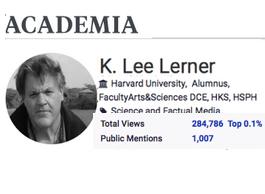This sixth edition of the Gale Encyclopedia of Science, is devoted to providing younger students and general readers with a foundation upon which to build an understanding of modern science and its applications to contemporary global issues...Although as expansive and inclusive as size allows, any encyclopedia devoted to science can only hope to wade a bit along the shore of a vast ocean of knowledge. For that reason, the Gale Encyclopedia of Science, 6th Edition topics are carefully selected to present fundamental and relevant information in key areas across the science curriculum.
IMPORTANT UPDATES
Gale Encyclopedia of Science, 6th Edition features revisions to more than 2,660 articles, and includes more than 34 new articles. More than 769 entries feature substantial new sections and updates.
At its printing, the Gale Encyclopedia of Science, 6th Edition features the latest in vetted climate data from the National Aeronautics and Space Administration (NASA), National Oceanic and Atmospheric Administration (NOAA), and the most recent assessments made by the Intergovernmental Panel on Climate Change (IPCC) and other global monitoring agencies on topics ranging from atmospheric greenhouses gas levels to sea level rise. Key articles also include information and generalized predictions relating climate change to severe storms, floods, and draught for regions around the world including the impacts of climate change—both observed and predicted—in Africa, Asia, Australia and New Zealand, Europe, North America, South America, and in small island nations.
With a global pandemic of COVID-19 underway due to an outbreak of the novel SARS-CoV-2 virus, the editors have attempted to strengthen this edition's coverage of emerging diseases. The Gale Encyclopedia of Science includes updated articles on epidemics, pandemics, epidemiology, hepatitis variants, SARS, H1N1, H5N1, the MERS coronavirus in the Middle East, the H7N9 flu virus and a new article on the first six months of the 2020 COVID-19 pandemic. Because knowledge related to these diseases—especially COVID- 19—changes rapidly with science and medical advances, readers must always consult their personal health care provider to ensure that they have the latest information that applies to their individual needs.
Advances in biotechnology, especially related to genome editing and related molecular genetic engineering technologies—including 2020 Nobel Prize winning work related to the development of CRISPR technologies—are expertly covered in Gale Encyclopedia of Science, 6th Edition
This set is designed to prepare students and other readers for the future. While science and technology related news regarding new space missions, new particle discoveries, new climate data, emerging disease outbreaks, and biotechnology move at a fast pace, the inevitable changes and future discoveries related to the topics covered actually enhance the value of an encyclopedia like Gale Encyclopedia of Science, 6th Edition that is dedicated to fundamental science because the articles contain explanations of theories, laws, and prior discoveries that foster a contextual understanding of the new advances...
K. Lee Lerner
Cambridge, Massachusetts
November 2020.
K. Lee Lerner, is the senior science correspondent and commissioning editor for LMG (London • Paris • Cambridge) and served as editor of the Gale Encyclopedia of Espionage, Intelligence, and Security, Climate Change in Context, and many other award-winning books and articles on science, technology, and a range of global issues. He is a member of the National Press Club in Washington, D.C., and serves on the Advisory Board at American Men and Women of Science. Along with Brenda Wilmoth Lerner, he served as editor for three prior editions of the Gale Encyclopedia of Science and he continues to serve as an advisor and contributor to this updated 6th edition. A full biography and list of his work may be found at https://scholar.harvard.edu/kleelerner and https://harvard.academia.edu/KLeeLerner/.




